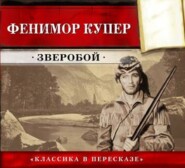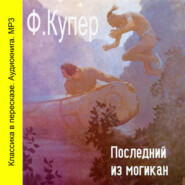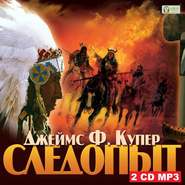По всем вопросам обращайтесь на: info@litportal.ru
(©) 2003-2024.
✖
Mercedes of Castile: or, The Voyage to Cathay
Настройки чтения
Размер шрифта
Высота строк
Поля
"Your grace hath promised that there should be nothing wanting to the consent of the church on this solemn occasion. It is known that Don Fernando of Aragon and I stand within the prohibited degrees."
"Most true, my Lady Isabella," returned the prelate, with a composed mien and a paternal smile. "Happily, our Holy Father Pius hath removed this impediment, and the church smileth on this blessed union in every particular."
The archbishop then took out of his pocket a dispensation, which he read, in a clear, sonorous, steady voice; when every shade disappeared from the serene brow of Isabella, and the ceremony proceeded. Years elapsed before this pious and submissive Christian princess discovered that she had been imposed on, the bull that was then read having been an invention of the old King of Aragon and the prelate, not without suspicions of a connivance on the part of the bridegroom. This deception had been practised from a perfect conviction that the sovereign pontiff was too much under the influence of the King of Castile, to consent to bestow the boon in opposition to that monarch's wishes. It was several years before Sixtus IV. repaired this wrong, by granting a more genuine authority.
Nevertheless, Ferdinand and Isabella became man and wife. What followed in the next twenty years must be rather glanced at than related. Henry IV. resented the step, and vain attempts were made to substitute his supposititious child, La Beltraneja, in the place of his sister, as successor to the throne. A civil war ensued, during which Isabella steadily refused to assume the crown, though often entreated; limiting her efforts to the maintenance of her rights as heiress presumptive. In 1474, or five years after her marriage, Don Henry died, and she then became Queen of Castile, though her spurious niece was also proclaimed by a small party among her subjects. The war of the succession, as it was called, lasted five years longer, when Joanna, or La Beltraneja, assumed the veil, and the rights of Isabella were generally acknowledged. About the same time, died Don John II., when Ferdinand mounted the throne of Aragon. These events virtually reduced the sovereignties of the peninsula, which had so long been cut up into petty states, to four, viz., the possessions of Ferdinand and Isabella, which included Castile, Leon, Aragon, Valencia, and many other of the finest provinces of Spain; Navarre, an insignificant kingdom in the Pyrenees; Portugal, much as it exists to-day; and Granada, the last abiding-place of the Moor, north of the strait of Gibraltar.
Neither Ferdinand, nor his royal consort, was forgetful of that clause in their marriage contract, which bound the former to undertake a war for the destruction of the Moorish power. The course of events, however, caused a delay of many years, in putting this long-projected plan in execution; but when the time finally arrived, that Providence which seemed disposed to conduct the pious Isabella, through a train of important incidents, from the reduced condition in which we have just described her to have been, to the summit of human power, did not desert its favorite. Success succeeded success – and victory, victory; until the Moor had lost fortress after fortress, town after town, and was finally besieged in his very capital – his last hold in the peninsula. As the reduction of Granada was an event that, in Christian eyes, was to be ranked second only to the rescuing of the holy sepulchre from the hands of the Infidels, so was it distinguished by some features of singularity, that have probably never before marked the course of a siege. The place submitted on the 25th November, 1491 – twenty-two years after the date of the marriage just mentioned, and, it may not be amiss to observe, on the very day of the year that has become memorable in the annals of this country, as that on which the English, three centuries later, reluctantly yielded their last foothold on the coast of the republic.
In the course of the preceding summer, while the Spanish forces lay before the town, and Isabella, with her children, were anxious witnesses of the progress of events, an accident occurred that had well nigh proved fatal to the royal family, and brought destruction on the Christian arms. The pavillion of the queen took fire, and was consumed, placing the whole encampment in the utmost jeopardy. Many of the tents of the nobles were also destroyed, and much treasure, in the shape of jewelry and plate, was lost, though the injury went no further. In order to guard against the recurrence of such an accident, and probably viewing the subjection of Granada as the great act of their mutual reign – for, as yet, Time threw his veil around the future, and but one human eye foresaw the greatest of all the events of the period, which was still in reserve – the sovereigns resolved on attempting a work that, of itself, would render this siege memorable. The plan of a regular town was made, and laborers set about the construction of good substantial edifices, in which to lodge the army; thus converting the warfare into that of something like city against city. In three months this stupendous work was completed, with its avenues, streets, and squares, and received the name of Santa Fé, or Holy Faith – an appellation quite as well suited to the zeal which could achieve such a work, in the heat of a campaign, as to that general reliance on the providence of God which animated the Christians in carrying on the war. The construction of this place struck terror into the hearts of the Moors, for they considered it a proof that their enemies intended to give up the conflict only with their lives; and it is highly probable that it had a direct and immediate influence on the submission of Boabdil, the King of Granada, who yielded the Alhambra a few weeks after the Spaniards had taken possession of their new abodes.
Santa Fé still exists, and is visited by the traveller as a place of curious origin; while it is rendered remarkable by the fact – real or assumed – that it is the only town of any size in Spain, that has never been under Moorish sway.
The main incidents of our tale will now transport us to this era, and to this scene; all that has been related as yet, being merely introductory matter, to prepare the reader for the events that are to follow.
CHAPTER IV
"What thing a right line is, – the learned know;
But how availes that him, who in the right
Of life and manners doth desire to grow?
What then are all these humane arts, and lights,
But seas of errors? In whose depths who sound,
Of truth finde only shadowes, and no ground."
Human Learning.
The morning of the 2d of January, 1492, was ushered in with a solemnity and pomp that were unusual even in a court and camp as much addicted to religious observances and royal magnificence, as that of Ferdinand and Isabella. The sun had scarce appeared, when all in the extraordinary little city of Santa Fé were afoot, and elate with triumph. The negotiations for the surrender of Granada, which had been going on secretly for weeks, were terminated; the army and nation had been formally apprised of their results, and this was the day set for the entry of the conquerors.
The court had been in mourning for Don Alonso of Portugal, the husband of the Princess Royal of Castile, who had died a bridegroom; but on this joyous occasion the trappings of woe were cast aside, and all appeared in their gayest and most magnificent apparel. At an hour that was still early, the Grand Cardinal moved forward, ascending what is called the Hill of Martyrs, at the head of a strong body of troops, with a view to take possession. While making the ascent, a party of Moorish cavaliers was met; and at their head rode one in whom, by the dignity of his mien and the anguish of his countenance, it was easy to recognize the mental suffering of Boabdil, or Abdallah, the deposed monarch. The cardinal pointed out the position occupied by Ferdinand, who, with that admixture of piety and worldly policy which were so closely interwoven in his character, had refused to enter within the walls of the conquered city, until the symbol of Christ had superseded the banners of Mahomet; and who had taken his station at some distance from the gates, with a purpose and display of humility that were suited to the particular fanaticism of the period. As the interview that occurred has often been related, and twice quite recently by distinguished writers of our own country, it is unnecessary to dwell on it here. Abdallah next sought the presence of the purer-minded and gentle Isabella, where his reception, with less affection of the character, had more of the real charity and compassion of the Christian; when he went his way toward that pass in the mountains that has ever since been celebrated as the point where he took his last view of the palaces and towers of his fathers, from which it has obtained the poetical and touching name of El Ultimo Suspiro Del Moro.
Although the passage of the last King of Granada, from his palace to the hills, was in no manner delayed, as it was grave and conducted with dignity, it consequently occupied some time. These were hours in which the multitude covered the highways, and the adjacent fields were garnished with a living throng, all of whom kept their eyes riveted on the towers of the Alhambra, where the signs of possession were anxiously looked for by every good Catholic who witnessed the triumph of his religion.
Isabella, who had made this conquest a condition in the articles of marriage – whose victory in truth it was – abstained, with her native modesty, from pressing forward on this occasion. She had placed herself at some distance in the rear of the position of Ferdinand. Still – unless, indeed, we except the long-coveted towers of the Alhambra – she was the centre of attraction. She appeared in royal magnificence, as due to the glory of the occasion; her beauty always rendered her an object of admiration; her mildness, inflexible justice, and unyielding truth, had won all hearts; and she was really the person who was most to profit by the victory, Granada being attached to her own crown of Castile, and not to that of Aragon, a country that possessed little or no contiguous territory.
Previously to the appearance of Abdallah, the crowd moved freely, in all directions; multitudes of civilians having flocked to the camp to witness the entry. Among others were many friars, priests, and monks – the war, indeed, having the character of a crusade. The throng of the curious was densest near the person of the queen, where, in truth, the magnificence of the court was the most imposing. Around this spot, in particular, congregated most of the religious, for they felt that the pious mind of Isabella created a sort of moral atmosphere in and near her presence, that was peculiarly suited to their habits, and favorable to their consideration. Among others, was a friar of prepossessing mien, and, in fact, of noble birth, who had been respectfully addressed as Father Pedro, by several grandees, as he made his way from the immediate presence of the queen, to a spot where the circulation was easier. He was accompanied by a youth of an air so much superior to that of most of those who did not appear that day in the saddle, that he attracted general attention. Although not more than twenty, it was evident, from his muscular frame, and embrowned but florid cheeks, that he was acquainted with exposure; and by his bearing, many thought, notwithstanding he did not appear in armor on an occasion so peculiarly military, that both his mien and his frame had been improved by familiarity with war. His attire was simple, as if he rather avoided than sought observation, but it was, nevertheless, such as was worn by none but the noble. Several of those who watched this youth, as he reached the less confined portions of the crowd, had seen him received graciously by Isabella, whose hand he had even been permitted to kiss, a favor that the formal and fastidious court of Castile seldom bestowed except on the worthy, or on those, at least, who were unusually illustrious from their birth. Some whispered that he was a Guzman, a family that was almost royal; while others thought that he might be a Ponce, a name that had got to be one of the first in Spain, through the deeds of the renowned Marquis-Duke of Cadiz, in this very war; while others, again, affected to discern in his lofty brow, firm step, and animated eye, the port and countenance of a Mendoza.
It was evident that the subject of all these commentaries was unconscious of the notice that was attracted by his vigorous form, handsome face, and elastic, lofty tread; for, like one accustomed to be observed by inferiors, his attention was confined to such objects as amused his eye, or pleased his fancy, while he lent a willing ear to the remarks that, from time to time, fell from the lips of his reverend companion.
"This is a most blessed and glorious day for Christianity!" observed the friar, after a pause a little longer than common. "An impious reign of seven hundred years hath expired, and the Moor is at length lowered from his pride; while the cross is elevated above the banners of the false prophet. Thou hast had ancestors, my son, who might almost arise from their tombs, and walk the earth in exultation, if the tidings of these changes were permitted to reach the souls of Christians long since departed."
"The Blessed Maria intercede for them, father, that they may not be disturbed, even to see the Moor unhoused; for I doubt much, agreeable as the Infidel hath made it, if they find Granada as pleasant as Paradise."
"Son Don Luis, thou hast got much levity of speech, in thy late journeyings; and I doubt if thou art as mindful of thy paters and confessions, as when under the care of thy excellent mother, of sainted memory!"
This was not only said reprovingly, but with a warmth that amounted nearly to anger.
"Chide me not so warmly, father, for a lightness of speech that cometh of youthful levity, rather than of disrespect for holy church. Nay, thou rebukest warmly, and then, as I come like a penitent to lay my transgressions before thee, and to seek absolution, thou fastenest thine eye on vacancy, and gazest as if one of the spirits of which thou so lately spokest actually had arisen and come to see the Moor crack his heart strings at quitting his beloved Alhambra!"
"Dost see that man, Luis!" demanded the friar, still gazing in a fixed direction, though he made no gesture to indicate to which particular individual of the many who were passing in all directions, he especially alluded.
"By my veracity, I see a thousand, father, though not one to fasten the eye as if he were fresh from Paradise. Would it be exceeding discretion to ask who or what hath thus riveted thy gaze?"
"Dost see yonder person of high and commanding stature, and in whom gravity and dignity are so singularly mingled with an air of poverty; or, if not absolutely of poverty – for he is better clad, and, seemingly, in more prosperity now, than I remember ever to have seen him – still, evidently not of the rich and noble; while his bearing and carriage would seem to bespeak him at least a monarch?"
"I think I now perceive him thou meanest, father; a man of very grave and reverend appearance, though of simple deportment. I see nothing extravagant, or ill-placed, either in his attire, or in his bearing."
"I mean not that; but there is a loftiness in his dignified countenance that one is not accustomed to meet in those who are unused to power."
"To me, he hath the air and dress of a superior navigator, or pilot – of a man accustomed to the seas – ay, he hath sundry symbols about him that bespeak such a pursuit."
"Thou art right, Don Luis, for such is his calling. He cometh of Genoa, and his name is Christoval Colon; or, as they term it in Italy, Christoforo Colombo."
"I remember to have heard of an admiral of that name, who did good service in the wars of the south, and who formerly led a fleet into the far east."
"This is not he, but one of humbler habits, though possibly of the same blood, seeing that both are derived from the identical place. This is no admiral, though he would fain become one – ay, even a king!"
"The man is, then, either of a weak mind, or of a light ambition."
"He is neither. In mind, he hath outdone many of our most learned churchmen; and it is due to his piety to say that a more devout Christian doth not exist in Spain. It is plain, son, that thou hast been much abroad, and little at court, or thou wouldst have known the history of this extraordinary being, at the mention of his name, which has been the source of merriment for the frivolous and gay this many a year, and which has thrown the thoughtful and prudent into more doubts than many a fierce and baneful heresy."
"Thou stirrest my curiosity, father, by such language. Who and what is the man?"
"An enigma, that neither prayers to the Virgin, the learning of the cloisters, nor a zealous wish to reach the truth, hath enabled me to read. Come hither, Luis, to this bit of rock, where we can be seated, and I will relate to thee the opinions that render this being so extraordinary. Thou must know, son, it is now seven years since this man first appeared among us. He sought employment as a discoverer, pretending that, by steering out into the ocean, on a western course, for a great and unheard-of distance, he could reach the farther Indies, with the rich island of Cipango, and the kingdom of Cathay, of which one Marco Polo hath left us some most extraordinary legends!"
"By St. James of blessed memory! the man must be short of his wits!" interrupted Don Luis, laughing. "In what way could this thing be, unless the earth were round – the Indies lying east, and not west of us?"
"That hath been often objected to his notions; but the man hath ready answers to much weightier arguments."
"What weightier than this can be found? Our own eyes tell us that the earth is flat."
"Therein he differeth from most men – and to own the truth, son Luis, not without some show of reason. He is a navigator, as thou wilt understand, and he replies that, on the ocean, when a ship is seen from afar, her upper sails are first perceived, and that as she draweth nearer, her lower sails, and finally her hull cometh into view. But thou hast been over sea, and may have observed something of this?"
"Truly have I, father. While mounting the English sea, we met a gallant cruiser of the king's, and, as thou said'st, we first perceived her upper sail, a white speck upon the water; then followed sail after sail, until we came nigh and saw her gigantic hull, with a very goodly show of bombards and cannon – some twenty at least, in all."
"Then thou agreest with this Colon, and thinkest the earth round?"
"By St. George of England! not I. I have seen too much of the world, to traduce its fair surface in so heedless a manner. England, France, Burgundy, Germany, and all those distant countries of the north, are just as level and flat as our own Castile."
"Why, then, didst thou see the upper sails of the Englishman first?"
"Why, father – why – because they were first visible. Yes, because they came first into view."
"Do the English put the largest of their sails uppermost on the masts?"
"They would be fools if they did. Though no great navigators – our neighbors the Portuguese, and the people of Genoa, exceeding all others in that craft – though no great navigators, the English are not so surpassingly stupid. Thou wilt remember the force of the winds, and understand that the larger the sail the lower should be its position."
"Then how happened it that thou sawest the smaller object before the larger?"
"Truly, excellent Fray Pedro, thou hast not conversed with this Christoforo for nothing! A question is not a reason."

















